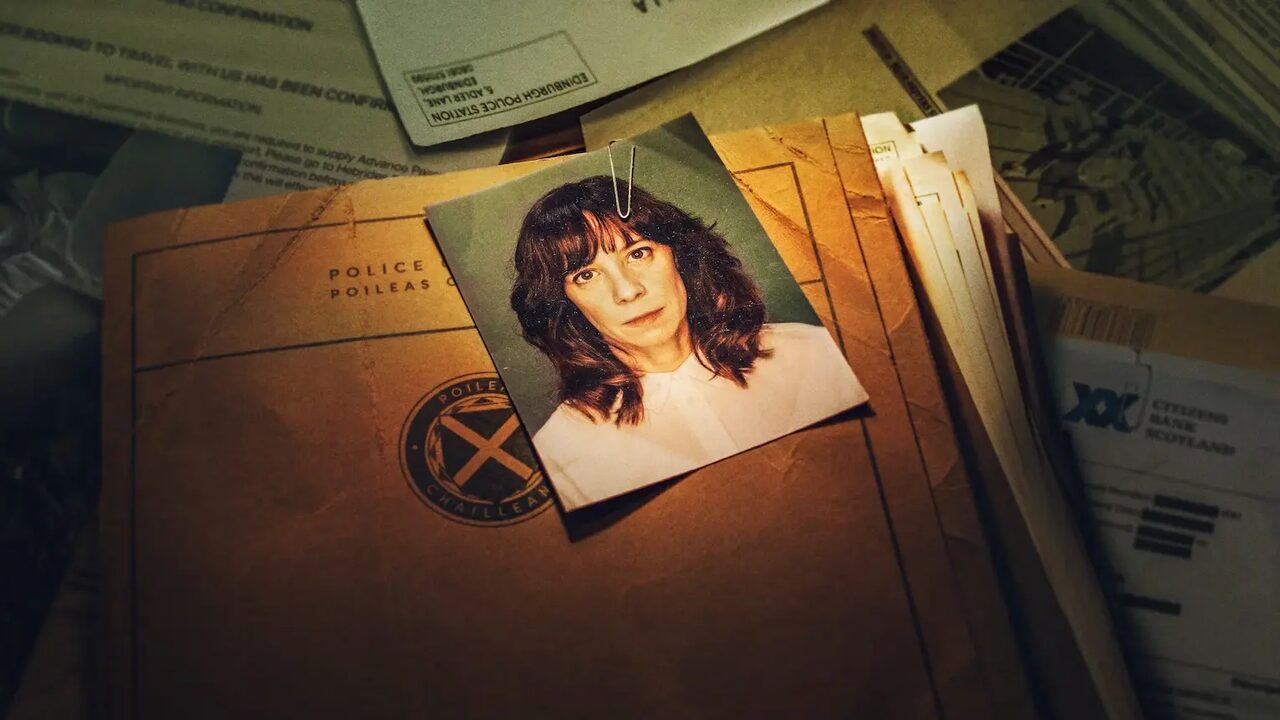
With Department Q or Dept. Q, creators Scott Frank and Chandni Lakhani have made a slick nine-episode-long crime drama that's as tedious as those Netflix shows designed to keep viewers logged in for as long as possible. This one, at least, is a bit more bearable and watchable. It's also quite clever, which becomes evident by the end of the first episode when you realize that two events are not unfolding at the same time. We watch detective Carl Morck (Matthew Goode) coping with a tragedy that took the life of a police officer and rendered his partner, DS Hardy (Jamie Sives), paralyzed. We also follow a lawyer named Merritt Lingard (Chloe Pirrie), who has a tough day at the court, gets disturbing texts on her phone, and has a brother, William (Tom Bulpett), who has cognitive impairments. When the episode ends, it's revealed to us that there is a four-year gap between the two threads. Merritt went on a ferry with William in the past and...disappeared. In the present, Carl investigates her disappearance. Or is she dead? Carl initially shows no interest in the case. He doesn't even pick it for his first assignment as the head of the titular department. It's Akram Salim (Alexej Manvelov), a Syrian refugee desperately seeking a job at Carl's office, who reviews all the files and identifies potential in the Merritt Lingard case.
The characters here can be neatly slotted into clichés. Akram is "the muscle man." Carl is that genius cop who isn't fired or suspended even when he disobeys orders or spills blood in public places. Rose (Leah Byrne), Carl's colleague, is that underappreciated worker who desperately wants to prove herself. Carl has a rough relationship with his stepson, Jasper (Aaron McVeigh), because...he is a teenager. His mother, an air hostess, is constantly traveling. How does he feel about this distance? Does he ever get angry at his mother for being absent? Which school does he go to? What grade is he in? What do Jasper and his mother talk about in their free time? Carl is forced to see a therapist due to that shooting incident at the beginning of Episode 1. That therapist turns out to be Dr. Rachel Irving (Kelly Macdonald). Since she's good-looking and Carl is good-looking, they both slowly fall in love with each other. They, of course, don't immediately confess that they are attracted to one another. Irving even goes on a date with someone, though what she does during this meeting is never revealed to the audience. All those nine episodes should have been used to add depth and intimate details to the show (Akram talks to Carl about his children, but we never see him talking to them, checking on them. His conversations with Carl provide generic details about his personal life). But Dept. Q is more interested in recycling old parts, which are covered with a fresh, shiny paint that doesn't really conceal the stench of unoriginal execution.
Jussi Adler-Olsen's books, on which this series is based, are set in Denmark. Frank and Lakhani change the setting to Scotland. Dept. Q was filmed in Edinburgh, and for a while, you can admire the landscape, the architecture, and the windy weather. Merritt's father lives in a small house that's surrounded by green, dense forest and located near windy waters. If only you could walk into a TV show. Still, Dept. Q mostly avoids "touristy visuals." The focus is more on the story, which is mainly plot-driven. This is a very talky show, but the actors lend weight and/or humor to their lines, making the dialogue enjoyable. Someone like Shirley Henderson, with her thin, cute voice, cheers you up. Then there is someone like Pirrie who really makes you believe that she's going through all that torture. The torture scenes are displayed with two black bars that appear on the left and the right side of the screen to underline the notion that Merritt is trapped in a tight, closed environment. It's an unnecessary and distracting touch. Pirrie's performance is more than enough for the task - she does her job well.
In Dept. Q, the scenes don't flow. There are no segues and no connective tissues. Rather, the scenes are chopped and arranged like self-contained boxes, and the camera jumps from one box to another. As a result, the scenes don't come on the screen; they jump out at you and grab you by the collar. This approach seems tailored for audience members with short attention spans. Nonetheless, the runtime leaves you exhausted. Hence, we, along with Merritt, feel grateful towards the end. The unpleasant experience concludes, allowing everyone to leave with either a sigh of relief or a smile on their face. It's the only moment when we truly connect emotionally with the characters. Will Dept. Q be renewed for a second season? Well, I am in no rush to return to that dingy basement.
Final Score- [5.5/10]
Reviewed by - Vikas Yadav
Follow @vikasonorous on Twitter
Publisher at Midgard Times
Hi Everyone, after a due consideration, we have decided that we will be open for donations to help us in managing our website. We will be greatful for any kind of amount we receive. Thanks!
— Midgard Times 🎬 (@Moviesr_net) January 4, 2026
PayPal- [email protected] pic.twitter.com/DlNNz5Npm5
Get all latest content delivered to your email a few times a month.
Bringing Pop Culture News from Every Realm, Get All the Latest Movie, TV News, Reviews & Trailers
Got Any questions? Drop an email to [email protected]